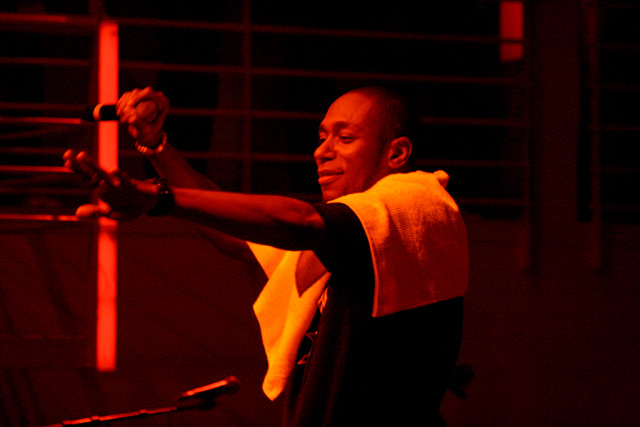Yasiin Bey is exhausted.
It’s the third straight evening he’s played for two hours straight. Monday night’s performance was extraordinary, not just for his impressive display of his considerable talents, but also because it would be his last show as a rapper. He’s decided to unplug his iconic red microphone forever and end his legendary recording career for other pursuits.
Ahmad Coo is a producer and copy editor for the Global Business America show on CCTV America. His analysis represents his views alone.
Some are skeptical about how serious he is about retiring from hip-hop, but then again Bey isn’t really like most of his peers. His work with Rawkus Records, including his collaboration with Talib Kweli on Black Star and his solo album Black on Both Sides, have always been the stuff of legend.
But since then, his output has slowed to a trickle. His last two rap albums as Mos Def, the Ecstatic (2009) and New Danger (2004), haven’t been critical or commercial successes, but listening to them they’re really more experiments and attempts to push beyond the boundaries of hip hop conventionality.
For his three shows at the Kennedy Center, he mostly set aside those experiments. He was game for what he called the Mos Def time machine- going through the catalog of his biggest hits. From Ms. Fat Booty to Definition from his album ‘Mos Def and Talib Kweli are Black Star’ (2002) with special guest Talib Kweli joining him onstage for two nights. He even brought out Pharoahe Monch and the legendary Slick Rick. Bey’s gifts were on full display during his three-day residence at the Kennedy Center. He rapped, sang, danced, recited poetry, showed off his drumming and jazz piano chops and even did a little standup comedy.
For three nights, he reminded everyone of his greatness as a rapper. I truly believe he’s a generational talent. Though unlike most of his gifted peers, he’s leaving hip-hop at the top of his game. Aside from a few unreleased tracks and an album he co-produced with Ferrari Sheppard as the group December 99th, there’s nothing else planned and some may lament about what could have been. But then again, he’s never really shown ambitions to stay as one of rap’s biggest stars.
Bey has more in common with the late David Bowie than a Kanye West or a Jay Z. Just like the Thin White Duke, he seems more interested in exploring the wider world of art. That’s why both Bowie and Bey’s influence extends beyond their respective genres. If you didn’t already know, Bey is also one of the most talented actors of his generation. He’s been nominated for an Emmy and a Golden Globe for his work.
But even with all the accolades from his peers, Bey’s continuous exploration of other forms of expression only highlights his restlessness. It’s not a surprise then that he shed his nom de guerre Mos Def five years ago in favor of Yasiin Bey- as if to signal a new phase of his career. Except for a few unreleased recordings, Bey says he’s giving up everything to focus on his painting and working on performance pieces with a prominent artist in South Africa. If you didn’t know anything about Bey, you’d be forgiven to think that he’d gone off the reservation.
It makes sense. If you’ve ever been touched with inspiration or a desire to create, you understand that one has to explore the way to express those ideas. Hip hop and film had served that purpose for Bey early in his career- channeling his energies into some of the most influential recordings of the early twenty-first century. His shift into painting in the past year shows that he’s no longer solely focusing on music. That restlessness and constant push to explore has always been present for Bey.
While some of his biggest hits tread familiar hip-hop tropes, spirituality, and his faith is equally present, if not more so, in his body of work. Bey begins every record by reciting Bismillah hir Rahman nir Raheem- the same phrase that opens the holiest book of Islam- the Quran. It roughly translates to ‘In the name of God, the most beneficent and most merciful.’ The phrase is a clue to Bey’s motivations.
Bey is setting his sights beyond this world. He’s referred to the infinite numerous times in his work. He explores this spirituality on ‘Black on Both Sides’. At the start of the track he raps: ‘They say the goodness in life belongs to those who believe, so I believe.’ This is an oft-stated and explored theme in Islam which says God rewards those who have faith. That message is also echoed his oft-repeated mantra ‘live in the now, for the promise of the infinite’. In Islam, the faithful aren’t just exhorted to pray and worship God, they’re encouraged to be fully engaged in the world.
Looking at Bey’s body of work as a whole, it’s obvious that he’s striving, not for pop star immortality, but for something so much greater than this world. In his final three concerts, I saw an artist who’s hyper-aware of his frailty. He lamented his aching body and the hardships he’s had to endure as an entertainer. Indeed when one is increasingly faced with one’s own mortality, everything unnecessary falls away- whether it be money, fame or worldly delights. Bey’s retirement from hip hop and his move from the U.S. to South Africa reveals a knowledge, a truth: That none of his success matters without meaning. It’s a lesson he tried to convey to his audience and fans, albeit in a roundabout, messy way.
It’s no surprise then that his striving for meaning would eventually lead him to more socially conscious causes. In 2013, he subjected himself to the force feeding that was performed on detainees in the U.S. detainee camp in Guantanamo Bay for suspected militants. A human rights group filmed the process and uploaded it to the Internet. The stunt was praised and mocked in equal measure. Supporters said it was a way to spread the word about the illegal actions taken by the U.S. to ignore due process and torture the detainees. His detractors said it was a cynical ploy to drive album sales and promote his brand.
His activism also probably led to his decision to finally leave the U.S. for good. Islamophobia has been on the rise in the U.S., and given the state of political discourse in the country, it may sadly get worse for Muslims before it gets better. Bey hasn’t given a definitive reason why he’s decided to make South Africa his home. But in an interview last year, he said America is a very challenging place. He added: “Given the current social, political, economic climate, it’s very difficult. To create to the degree of fullness, the type of robust, type of creativity I like to have, it’s very difficult for me to produce that here.”
Bey’s message urging us to live in the now resonates more urgently for this writer. Just last month, one of my friends passed away suddenly without a warning. Our careers had followed a similar path and we had climbed the ladder early in our careers. But the rat race we were trying to run basically ended with us slamming into a wall during the financial crisis.
We both lost our jobs and have struggled mightily ever since. While I’ve recovered somewhat, my friend found it difficult to land steady work. For a while, I believe his career defined who he was, but when it disappeared he was lost. I think that loss of meaning is what eventually killed him. I learned about my friends passing a few days before Yasiin Bey’s farewell concerts, and his death weighed heavily on my mind while I was bidding farewell to one of my hip hop heroes.
In his final concert at the Kennedy Center, Bey was understandably emotional. Halfway through his set, he had to tell his DJ to stop the beats because he had to tell everyone that he couldn’t believe that he’s ending his rap career at the Kennedy Center. Someone who, at the start of his career in the Brooklyn projects, never imagined that he would be performing at a venue that represents the pinnacle of American artistic achievement. That’s why I found it so refreshing that he was so humbled to be performing in such a venue.
At first, I thought the choice of playing the Kennedy Center was odd because he’s from New York. Wouldn’t it make more sense for him to wrap up his hip hop career in the city where it started? But watching his last few performances, I realized it didn’t matter where he ended his career. Because his music transcends geography. I’m pretty sure his fans in the Marcy projects have their equally passionate counterparts in every country in the world. As I’ve said repeatedly, his work- along with his predecessors recording- inform what hip hop is today.
In his last encore for his last concert, he was overcome as he sang the chorus to Umi Says. He was repeating the line ‘to be free, to be free, I want my people to be free,’ when he choked up. It was as if he realized that his days as one of hip hop’s greatest influencers was over but also relieved and thankful for all the successes and the artistic freedom it afforded him. He stopped rapping and looked out to the audience, tears streaming down his face, a fist in the air. It was a sight to behold- an artist saying farewell on his own terms to an audience grateful to have witnessed his singular greatness.
 CGTN America
CGTN America Photo credit: Gergely Csatari
Photo credit: Gergely Csatari

